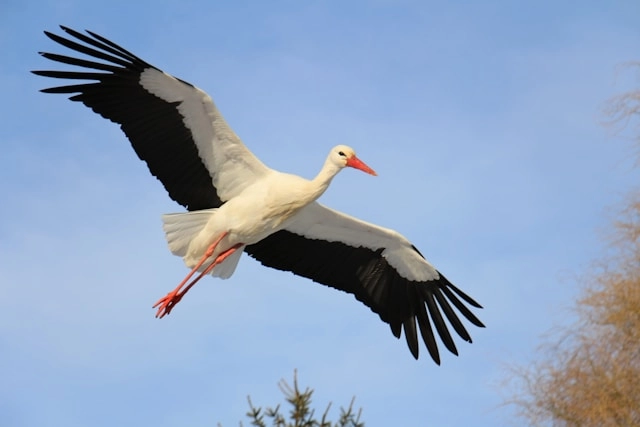Stork

📸 Photo by Janet on Unsplash
Tall, red-billed and patient, the white stork glides over fields and rooftops across Europe before wintering in Africa. Standing over a metre, it spears frogs, fish and voles in marshes. Its nest on chimneys and church towers has made it a long-lived symbol of luck and new life.
Technical factsheet
Habitat: The Stork can be found in Algeria, Angola, Armenia, Azerbaijan, Bangladesh, Belgium, Benin, Botswana, Bulgaria, Burkina-faso, Burundi, Cameroon, Central-african-rep, Chad, China, Dem-rep-congo, Czechia, Cote-d-ivoire, Denmark, Djibouti, Egypt, Eritrea, Eswatini, Ethiopia, France, Gabon, Georgia, Ghana, Greece, Guinea, Guinea-bissau, Hungary, India, Iran, Iraq, Israel, Italy, Latvia, Lesotho, Libya, Luxembourg, Malawi, Mali, Mauritania, Moldova, Montenegro, Morocco, Mozambique, Namibia, Nepal, Netherlands, Niger, Nigeria, Macedonia, Oman, Pakistan, Poland, Portugal, Romania, Russia, Rwanda, Senegal, Serbia, Slovakia, Slovenia, Somalia, South-africa, Spain, Sri-lanka, Sudan, Switzerland, Tanzania, Thailand, Togo, Tunisia, Turkey, Uganda, Ukraine, W-sahara, Yemen, Zambia, Zimbabwe, Albania, Austria, Belarus, Bosnia-and-herz, Croatia, Estonia, Germany, Kazakhstan, Kyrgyzstan, Lithuania, Sweden, Tajikistan, Turkmenistan, Uzbekistan, S-sudan, Afghanistan, Cyprus, Jordan, Kenya, Kuwait, Lebanon, Palestine, Qatar, Saudi-arabia, Syria, United-arab-emirates, Congo, Finland, Gambia, Iceland, Ireland, Liberia, Norway, United-kingdom